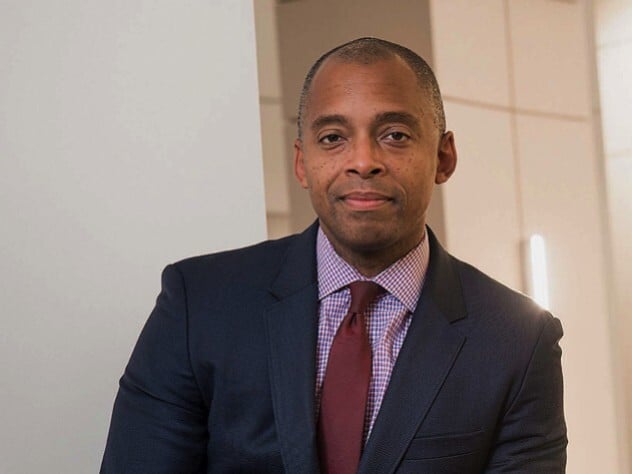Harvard's Dr. Khalil Muhammad Shares Perspective on U.S.'s History of Systemic Racism in Terrier Talks

"Being a well-educated person is not just about a career and making money. It is also about having a stake in the community you live in, so that justice lives and breathes in that community."
Reflecting on what college students can do to combat systemic racism, Khalil Muhammad, Ph.D., Ford Foundation professor of history, race and public policy at Harvard Kennedy School, joined Miguel Martinez-Saenz, Ph.D., president of St. Francis College, and SFC students for an hour-long, wide-ranging conversation that delved into a host of issues he sees as having contributed to sustaining racism in the United States.
The March 24, 2021, event was part of Terrier Talks, a discussion series that introduces SFC students to leaders in a variety of professions so they can think broadly about their own futures.
Among topics Dr. Muhammad addressed include the use of data to affirm racist practices beginning more than a century ago, the role of overbudgeted police departments in racial oppression, and the need to begin educating children as young as 2 about racial justice as a "vaccine" against racist beliefs.
Dr. Muhammad described his own pivot from his intended business career to one of academic historian as motivated, in part, by an invitation he received in college to debate a fellow student who passionately opposed affirmative action.
"I felt like I would lose that debate. I felt like I didn't know enough of my own history," he said. "I knew in my heart what was right, [but] I declined. I never, ever, from that moment to this day, never once wanted to feel vulnerable that someone could talk me out of my truth."
Dr. Muhammad – the former Director of the Schomburg Center for Research in Black Culture, a division of the New York Public Library and the world's leading library and archive of global Black history – discussed how using statistics about Black men's incarceration rates to promote racist policing and punishment practices can be traced to the late 1890s, when such data was first collected and deployed by powerful white leaders to deny civic, social and economic power to Black people.
According to Dr. Muhammad, by the 1990s, powerful leaders were still using such numbers – including the often-cited statistic that as many as 1 in 3 Black men would be incarcerated in their lifetimes – to increase the intrusive overreach of police in many communities and the excessive punishments handed down to Black people in courts.
"They doubled down on the segregation, they doubled down on what I call 'criminalization,' which is basically to call an entire group of people criminals," he said, referencing leaders like New York City's Mayor Rudolph Giuliani and Police Commissioner Bill Bratton.
"And that's what stop-and-frisk was all about when it happened in 2000, 2010, up until [it ended with] the federal lawsuit...It was all about ascribing to entire communities that everybody that lives in that community is a suspect and might as well be a criminal. Because if they're not a criminal today, they're going to be a criminal tomorrow."
Dr. Muhammad also defended the "defund the police" movement that he said is gaining significant public-policy momentum after the high-profile killings of Breonna Taylor and George Floyd by police officers last year.
"What I'm seeing essentially is that there is much more movement towards greater attention to all of the ancillary systems that already exist in our society. From our mental health systems to our social service system, our child welfare system, our education systems, our public health systems," he said of the growing move to eliminate racism in policing.
"[People] are starting to ask, 'Why is it that in many municipalities, the police budget is the largest line item on a budget?' Because for too long, police officers have been...social workers with guns. And then the question is, 'Does that make any sense?'"
Citing the challenges to changing people's racist behavior once they are adults, Dr. Muhammad addressed the importance of educating children at a very young age to inoculate them against racist beliefs.
"The use of knowledge to change behavior only gets us so far because the truth is that beliefs are more powerful than that. What people believe about how the world works usually trumps new information," he said.
"We can't wait until someone's in high school to begin to teach them how not to discriminate based on perceived difference or deficiency. We need to teach children very young. And I think that that is a social vaccine...The virus of racism and discrimination...is built into the environment. And so we need to protect ourselves and our children at very young ages from this, by exposing them to the problem itself."
Dr. Muhammad is the ninth guest in Terrier Talks, which debuted last year and is produced by the St. Francis College President's Office.